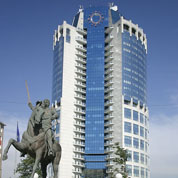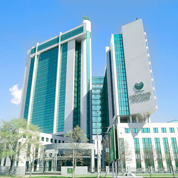Can Moscow really become a financial center in the new post-crisis world?

As the current global economic crisis is now in full swing, it will not be entirely correct at this point to start looking for who was right and wrong in his/her predictions of the financial meltdown. More important at this moment is the need to think about what lessons can be learnt from this downturn and how to prevent its occurrence in the future. In the same vein, it is necessary, when contemplating on Russia’s new role and place in the future, post-crisis global economy, to make the right conclusions from the current crisis.
The answer to the question whether or not Russia can build a modern, world-class financial center is rather positive. This is supported by the huge historical experience, which Moscow has acquired over the centuries, first as the center of the Russian Empire, and later as the capital of the now defunct Soviet Union, which had controlled almost half of the world at the zeniths of their glory. But today, speaking about the future of Russia, it is necessary to clearly understand how the current financial centers were formed and shaped in the precrisis period, which amongst them have the best immunity to unfavorable economic factors, and finally, which of them have been most devastated by the current crisis. It is also important for Russia to, at least, get acquainted with the key problems and issues identified in the Swiss strategy for developing its financial center. Specifically, the most important of these issues for Russia is how to organize global trading of its strategic resources on its territory.
The current state of the existing global financial centers
Using research data, I would like to propose the following classification of the existing global financial centers. Talking about the formation of a financial center in Russia in accordance with this classification, more serious attention should be paid to the development of key global market fundamentals and geo-economic situations in the world in the coming years. This is because the development strategy of Russia, as a key international financial center, should be based, at least, on the medium-term forecasts on how geopolitical, geo-economic and other considerations in the world change. This is because of the dynamism of these processes, which could be positive or negative, at the time of the realization of the adopted strategy.
"As most financial centers, the attributes of the current monetary system, lose their significance in the post-crisis era, Moscow’s chances of becoming a global financial center will significantly increase, thanks to its unique geographical location between Asia and Europe and also Russia’s rising weight in the global economy.”
Russia also needs to keep in mind the fact that today’s events, seen mainly as results of the exacerbation of the current crisis, will lead to fundamental transformations in the global financial system, which will significantly change the world’s geo-economic map. First of all, the fact that both globalization theory, which has been heavily promoted over past decade, and the global financial system, which was built on its basis, have been rendered completely bankrupt by the current crisis. Consequently, this new reality now necessitates a fundamental review of the basic economic principles, qualitative and quantitative indicators that define the concept of ‘global financial centers’ as this concept is intrinsically linked with globalization and foundation of the current global financial system on a single reserve currency, which is presently represented by the U.S. dollar. Furthermore, it should be noted, that the existing ratings of the world’s top financial centers, based on the ‘precrisis’ rules, are losing their relevance in the current business environment. Indeed, it is far from certain that either London or New York will able to retain their current leading positions on the international financial markets in the future, post-crisis global economy.
It is often assumed that when speaking about the ‘global’ or ‘regional’ financial centers in the context of the existing economic system that it is also equally implied that the flows of finances via such centers will be the based on the world’s current reserve currency. However, it needs to be noted here that a country, where foreign reserve currency dominates the local economic landscape, will surely come under the jurisdiction of the legal norms of such foreign country or global financial oversight structures, such as the World Bank or International Monetary Fund, which regulate the movement of such reserve currencies. Therefore, it is extremely important for  Russia to define the basic principles that will become the foundation for its development as a major international financial center.
Russia to define the basic principles that will become the foundation for its development as a major international financial center.
Different scenarios for Moscow evolving into a global financial center
However, there are not so many ‘starting points’ for this to happen, and indeed, there are, to be frank, only three feasible scenarios. The first envisages Russia accepting the current status quo in the global financial system as a fact and then tries to adopt a marketing strategy aimed at acquiring a significant share of the global financial services industry. If Russia chooses this scenario, then it must be ready create a highly competitive environment for global financial activities on its territory. But the result of such policy would be the loss of sovereignty over the national financial market, preservation of the domination of a foreign currency in Russia’s financial flows and the acceptance of its inability to revive and make its national currency competitive. This position will also lead to the further integration of Russia into the global economy and existing global organizations such as WTO, which, by the way, is also a key byproduct of the current global financial and economic systems. The end result of such policy will be Russia’s inability to change its economy’s ‘raw-commodities’ status, as the high technology and innovation niches are already occupied by other key players in the global labor distribution system.
The second scenario envisages the participation of Russia in one of the emerging regional monetary and financial systems such as the Euro project in Europe, the Golden Yuan project in Eastern and South-Eastern Asia, the Gulf Dinar project in the Middle East region, a unified South American currency project in Latin America, and, finally, the Amero project in North America. In many ways, this scenario is similar to the first, with the only difference being that Russia in the latter case can leverage its status better as a supplier of hydrocarbons to get more concessions when forming such regional alliances. And, lastly, the third scenario calls for the formation and development of an independent national financial center in Russia. This, in my opinion, is the only right way for Russia in the current business environment. The basis for the realization of this scenario should be the formation of prices on Russia’s export strategic raw materials in the country, and this, of course, goes without saying that such prices will be denominated exclusively in rubles.
“Indeed, it is far from certain today that either London or New York will be able to retain their current leading hegemonies on the international financial markets after global economic recovery.”
At a time, when the old stereotypes are being done away with, most financial centers — such as the so-called ‘quiet havens,’ ‘tax paradises’, etc., being byproducts of the current monetary system — will certainly lose their significance in the post-crisis era, where the only real centers of economic and financial attractions will be major production and/or transportation hubs. Moscow is one of such centers, as its unique geographical location makes it a major transit hub for trade, transport, migration and other links between Europe and Asia. In addition, the significance of Russia’s Northern Regions will in the medium-term perspective significantly increase as a result of global warming, thus boosting the development of the Arctic Region. This will boost Moscow’s attractiveness as it will not only become a key transit corridor between the East and West, but also between the North and South. The realization of these transportation corridors projects, together with the exclusive sales and exportations of Russia’s strategic raw-materials for rubles, should be the basis for the development strategy of Moscow as a national financial center of global importance. Undoubtedly, this scenario will lead to tightening of competition on the world arena, and thus substantially increasing the threats to Russia’s economic security, ruble stability and business relationships with foreign partners.
What Moscow should do to achieve its stated objectives
In order to successfully counteract such negative developments, Russia will need to pay serious attention to the development of such business facilities as modern stock exchange, banking and other financial infrastructures in Moscow, whilst preventing competition among Russian stock exchanges on the domestic market. Equally important will be the creation of a single strong national stocks platform for trading equities, commodities, futures and derivatives. It will also be critically necessary to establish a Central Depository and increase the capitalization of clearinghouse for stock exchange and other financial operations as well improve both regional and federal legislations in taxation, copyright protection and other spheres.
The realization of the Moscow financial center project will enable Russia to become the center for the formation of an independent regional financial and monetary system, whose members will, first and foremost, be other CIS countries, which are historically linked by trade and other economic ties with Russia.
*The author, Oleg Safonov, is the chairman of the founders board of the Russian Institute of Stock Market Development.












 Web design,
Web design,